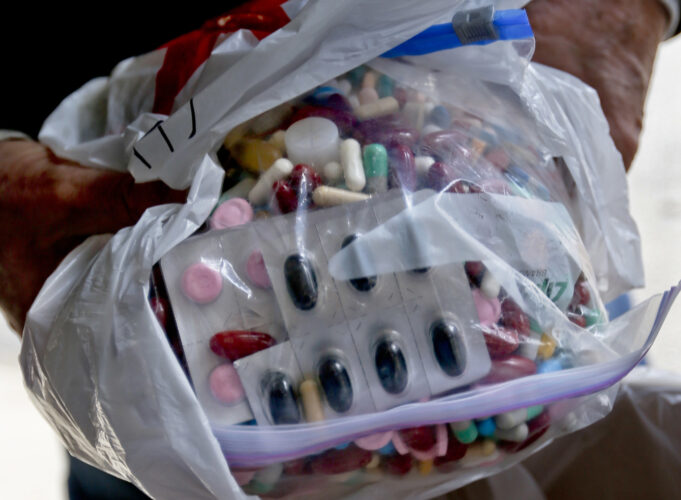Have unused prescription meds? Event offers safe disposal options

Keith Srakocic, Associated Press
People toss unneeded medicines into a bin as part of the Drug Enforcement Agency's National Take-Back Initiative on Saturday, April 28, 2018, at the the Allegheny County Police Department facility in McCandless, Pa. A release from the county said this annual event is for people to dispose of pharmaceutical controlled substances and other medications to law enforcement officers for destruction.Last year, there were more than 109,000 drug overdose deaths in the United States, according to the Centers for Disease Control and Prevention. One in four people are on at least three prescription medications, yet many of them don’t dispose of their drugs properly when they’re finished taking them.
During National Prescription Drug Take Back Day on Oct. 28, the public can drop off leftover prescription drugs at several locations around the state, including pharmacies and law enforcement agencies.
Nicole Chaus, regional director of pharmacy affordability at Optum, said it’s important to get rid of unused medication for many reasons, including the fact that some patients have to be readmitted to the hospital within 30 days of discharge because they have mismanaged their prescriptions.
“Prescription medication should be taken exactly how it’s prescribed by your physician. A lot of times, medicines are taken incorrectly or someone will pick up an old bottle laying around that may have the wrong prescription,” she said. “Many people will also have leftover painkillers sitting in the cabinet where anyone visiting the home can steal. It’s really best to not keep prescription medicine around when they aren’t currently needed.”
On Take Back Day, any prescription medication can be taken to a local drop-off site, including pills, patches and liquids, said Chaus. Unused pet medication also can be disposed of this way.
“If you have needles, you will have to get a Sharps needle box. Once the box is full, the lid will lock once it’s closed,” she said. “You can’t take needles to any drop-off places but there should be instructions on the box as to where you can take them once they’re full.”
For anyone with medicine that comes in patch form, Chaus said to fold the patch in half so the side that sticks to your body isn’t exposed, then place it inside a plastic bag. Some of these medications include fentanyl, lidocaine and nicotine patches.
Chaus said she also recommends people remove the label from the medicine bottle so personal information won’t be exposed.
Ogden Regional Medical Center, 5475 S. 500 East, will also be participating as part of HCA Healthcare’s 5th annual Crush the Crisis initiative. The public can take their materials to the northeast portion of the hospital’s main parking lot.
Last year, all 15 HCA Healthcare divisions hosted events at more than 100 locations across 17 states. In total, approximately 19,423 pounds were collected. That’s equivalent to 13.4 million doses of unused and expired prescription medications.
“We feel it is crucial to bring awareness to the dangers of drug misuse and abuse as the nationwide drug overdose epidemic continues to grow,” said Dawn Harold, chief medical officer at Ogden Regional Medical Center. “As part of our commitment to the community, we are proud to support and help educate the community on the proper disposal of medications.”
Law enforcement officers from the Weber County Sheriff’s Office will be collecting the medications as well, including tablets, capsules and patches. Ointments, lotions, drops, liquid medication in leak-proof containers, vape cartridges without batteries and pet medication will also be accepted.
With so many drop-off options, there’s really no excuse for people to flush leftover medication down the drain or toilet, Chaus said. Putting it in the garbage disposal or throwing it in the trash is also discouraged.
“Flushing the medicine can pollute our water supply and some of those chemicals can dissolve and get into water, lakes and streams,” she said. “And people and animals can get the drugs if you throw them into the trash, and that can cause some potentially dangerous situations.”
To find a drop-off location near you, go to www.deadiversion.usdoj.gov.
